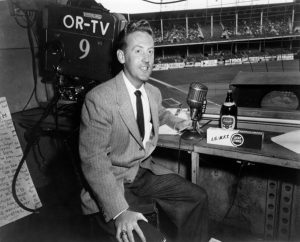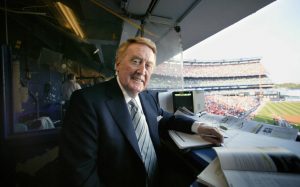Juan Soto, now of the San Diego Padres, has been hailed as a generational talent, the type who comes along alone approximately once per metaphorical blue moon. His numbers, expressed by slashes and birthdays, support that assertion. Juan Soto is a .291/.427/.538 slasher through nearly 2,500 plate appearances and he’s not even 24 years old. No wonder the Washington Nationals offered him a yachtload of money to stick around for the balance of his career. No wonder Soto turned it down, considering he could look forward to attracting an armada of dollars when he hits free agency like he hits major league pitching. No wonder he’s suddenly in San Diego. His past is already pretty good. His future looks bright. I’m glad the Mets don’t have to face him as often as they used to. I wouldn’t mind his future eventually finding its way to Flushing.
Generational, though? It’s hard to be certain unless you’ve had generations to prove it. You know who was a generational talent, who remains a generational talent and who will always stand as the generational talent of his craft?
The voice that spanned baseball generations.
Longevity is a heckuva badge to pin on somebody who lasted seemingly forever, but it’s not enough of an award for the memory of Vin Scully, who died Tuesday at 94. It’s not so much that Vin Scully was the Dodgers announcer in 1950, a year during which he was 22, and was the Dodgers announcer in 2016, signing off for good when he was 88. The length of his career, in and of itself, transcends impressive. Hardly any ballparks still standing have lasted as long on the job as Vin Scully did, and the ones that have each underwent significant renovations. Vin Scully was Vin Scully in 1950 and remained Vin Scully in 2016. He didn’t much change. He just kept being the best.
That’s more than longevity. It has to be. Implicit in manning a microphone from coast to coast, from Truman to Obama, is that nobody maintains the same high-profile role of a lifetime for 67 baseball seasons without vaulting to the top of his game and gripping that peak without pause. Loyalty and endurance can buy you some extra years in the right circumstance. The only circumstance that mattered where Vin Scully was concerned was he broadcast baseball games like Vin Scully. It was a singular skill set. If you couldn’t find another Vin Scully — and by definition you couldn’t — you couldn’t, shouldn’t, wouldn’t seek an alternative.
Ken Burns explained the thinking behind his choice of announcer talking heads for his Baseball project thusly: he wanted the grandfather, the father and the son. For him, that meant Red Barber, under whom Scully apprenticed in Brooklyn; Scully, who’d grown into an institution locally in Los Angeles and nationally whenever he moonlighted; and Bob Costas, who did the backup Game of the Week on NBC every Saturday while Scully took care of the main attraction. Barber called his first big league game in 1934. Costas is still calling them in 2022. Like Scully, they are ensconced in the mythical broadcasters’ wing of the Baseball Hall of Fame. Burns’s intuition was right on, and his landmark documentary series benefited from encompassing the observations of both Red Barber and Bob Costas. Yet, honestly, the filmmaker could have gone with just Vin Scully and it would have served essentially the same purpose.
 Vin was every generation. His status as the elder statesman who broadly bridged the millennia notwithstanding, whenever he was asked about what drew him to broadcasting, he was a kid again, inevitably describing (and always managing to relay it as if nobody had ever before inquired) parking himself under the radio speaker in his family’s living room, wishing to be bathed in the roar of the crowd. He followed the crowd to the source of that sound, out to the park and up to the booth, intent on telling the crowd what he and, soon enough with television, they were seeing. There were differences to calling a ballgame on radio and accompanying one on television. Nobody better understood that sometimes you’re the eyes for your audience and sometimes you’re chaperoning pictures, and that the pictures themselves can be left to tell key portions of the story best.
Vin was every generation. His status as the elder statesman who broadly bridged the millennia notwithstanding, whenever he was asked about what drew him to broadcasting, he was a kid again, inevitably describing (and always managing to relay it as if nobody had ever before inquired) parking himself under the radio speaker in his family’s living room, wishing to be bathed in the roar of the crowd. He followed the crowd to the source of that sound, out to the park and up to the booth, intent on telling the crowd what he and, soon enough with television, they were seeing. There were differences to calling a ballgame on radio and accompanying one on television. Nobody better understood that sometimes you’re the eyes for your audience and sometimes you’re chaperoning pictures, and that the pictures themselves can be left to tell key portions of the story best.
More than anything, the warmth in Vin Scully’s voice will stay with me. Every announcer invites you to stay tuned. Vin really welcomed you. Vin wanted you at the game, understanding that he was your conduit and it was up to him to provide you the most comfortable seat, the most accurate view, the most thorough and thoughtful experience possible. Vin also knew, even as he was the most accomplished, most experienced, most revered and most famous broadcaster in baseball history, that he himself wasn’t the game. He — along with Schaefer, Lucky Strike, Farmer John or whoever was footing the bill — was simply bringing it to you. And wasn’t he fortunate for the privilege?
Weren’t we?








“A little roller up along first… behind the bag! It gets through Buckner! Here comes Knight and the Mets win it!”
I loved Bob Murphy but that could have been the greatest call in Mets history.
“Through”. ‘By’ or ‘past’ would have been fine and standard word choices. But he went with the perfect word choice for the Buckner end of the play.
That said, Murphy’s call was worthy of the moment, too.
We were certainly lucky to have Vin for as long as we did. He never tried to portray himself as the smartest or funniest guy in the room, as Gary Cohen does.
Watching the Saturday afternoon ‘Game of the Week’ on NBC was a special pleasure. When you’re a kid, you may not be exactly sure why, but we now realize why. Vin was the comforting soothing voice of our Saturday afternoons, and we looked forward to those games because of him.
Gary pays homage.
That is so sweet. I loved Gary’s description of the Game 6 call — I always thought Vin’s silence after Knight scored, letting the cameras tell the story, was just brilliant.
Hard to be sad when someone dies at 94, but I am sad today.
Greg, please help me out.
Did NBC have exclusivity when they had a game on Saturday afternoons, or were the Mets allowed to be shown at the same time, 2pm, on Channel 9?
I say no exclusivity, because I remember watching a boatload of Met games on Channel 9 on Saturday afternoons, and I do not recall being hopping mad that they were not allowed to be televised at the same time.
In the 1970s, there was no exclusivity. There was also a blackout on NBC telecasts of New York teams in the New York market, so if the Mets were, by some miracle, the Game of the Week, we’d get it on Channel 9 (and get the Twins-White Sox or whatever was the “B” game on Channel 4). I think this changed in the ’80s and NBC did have over-the-air exclusivity, pushing Saturday afternoon games to SportsChannel — but the flip side was we got to see New York teams on the Game of the Week, and by then, the Mets were a network attraction.
Thanks, Greg, and “by some miracle” is right. They would only be on if the OTHER team was doing something historic, like when the Mets-Reds game was on ABC Monday Nite Baseball due to Pete Rose’s hitting streak.
G.O.A.T is overused these days. NOT with Vin
Vin and Jack Buck were the best. Of course, I’m biased because I was the CBS Radio engineer for both of them. I was so lucky.